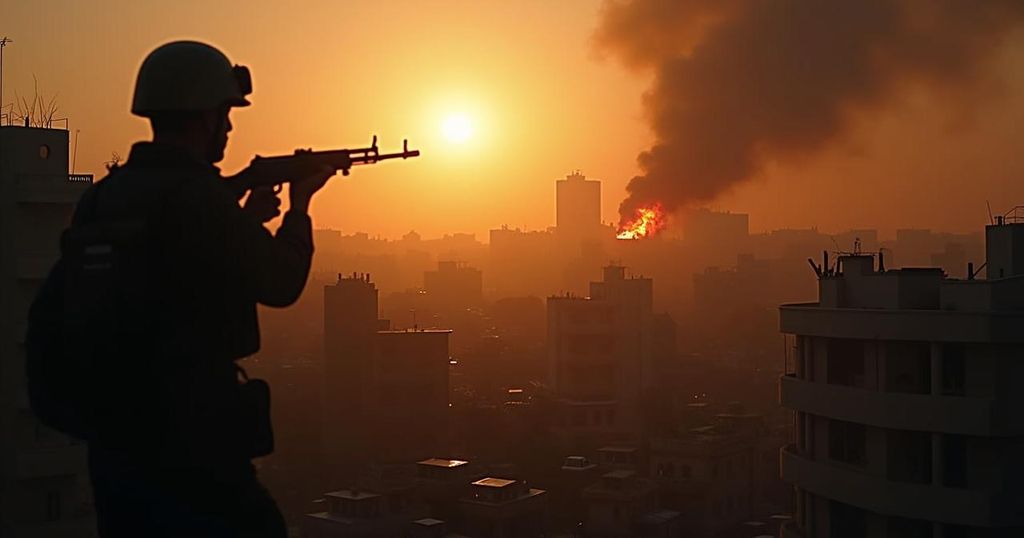Intensification of Israeli Military Offensive in Lebanon and Its Regional Implications

The article discusses the escalation of military action by the Israel Defense Forces (IDF) in Lebanon, targeting Hezbollah and Hamas, amidst a protracted conflict that has resulted in significant casualties and humanitarian crises across the region, with an emphasis on the historical context and international responses.
The Israel Defense Forces (IDF) have intensified their military offensive in Lebanon, conducting significant airstrikes on Thursday that targeted soldiers and medical personnel, particularly in the southern suburbs of Beirut. Additionally, the IDF confirmed a separate strike in the West Bank that aimed at a high-ranking Hamas leader in Tulkarm, resulting in the deaths of at least 18 individuals as reported by Palestinian authorities. This escalation is part of the ongoing Israel-Gaza conflict, which has persisted for over several months and has extended its repercussions throughout the broader Middle East region. The conflict began on October 7, when Hamas launched an unprecedented assault crossing into Israel which led to approximately 1,200 deaths and the taking of civilian hostages. In retaliation, Israel declared war on Hamas, subsequently initiating a ground invasion that has caused widespread displacement, marking the most significant such event since the establishment of Israel in 1948. Notably, in July 2024, the leader of Hamas, Ismail Haniyeh, was reportedly killed in an attack attributed to Israeli forces. Relations between Israel and Hezbollah, a militant group supported by Iran, have similarly deteriorated over the past year, culminating in an Israeli military operation in southern Lebanon characterized by increasing airstrikes. This activity has resulted in the deaths of over 1,400 individuals, including Hassan Nasrallah, the longstanding leader of Hezbollah. The Israel-Lebanon border has a historical context of violence, rooted in the foundation of the Israeli state. In the Gaza Strip, Israel has engaged in one of the most devastating military campaigns of the present century, with fatalities reaching into the tens of thousands, while current living conditions have descended into what many experts describe as famine-like conditions affecting at least half of the population. Despite international pressure, Israel has been reluctant to facilitate increased humanitarian aid into the Gaza region. The United States has maintained its support for Israel during these hostilities, despite some friction between Israeli Prime Minister Benjamin Netanyahu and several U.S. politicians, including President Biden. The U.S. continues to provide military assistance and funding to Israel while also exercising veto powers concerning United Nations resolutions aimed at initiating cease-fires. The historical backdrop of the Israeli-Palestinian conflict is intricate and deeply entrenched, predating Israel’s establishment in 1948 and is characterized by a long-standing legacy of mistrust and violence.
The Israel-Gaza war, ignited by Hamas’s unprecedented attack on Israel on October 7, involved complex responses leading to an Israeli declaration of war. This initiated a ground invasion aimed at Hamas, which has seen significant military actions escalate throughout the region. Concurrently, tensions with Hezbollah have also increased in southern Lebanon. The wider Middle East has felt the ripple effects of this conflict, with grappling humanitarian issues in Gaza and the historical undertones of the Israeli-Palestinian confrontation. The United States has played a critical role in supporting Israeli military actions despite rising calls for humanitarian relief efforts.
The ongoing conflict between Israel and Hamas has led to significant escalations in military actions both in Lebanon and Gaza, resulting in substantial casualties and humanitarian crises. The involvement of groups such as Hezbollah and the United States’ support of Israel complicate the landscape further. Understanding this conflict requires an appreciation of its historical complexities and the implications for regional stability.
Original Source: www.washingtonpost.com







